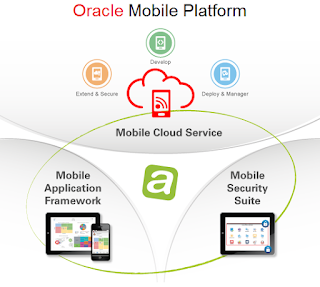Thanks to Oracle Weblogic Oracle Weblogic Community I had the opportunity to use a Oracle Mobile Cloud Service GSE instance a couple of weeks ago. In this post I am going to show you the different parts of this PaaS product that is part of Oracle Mobile Platform.
In my opinion it is a powerful easy to use tool that help us to simplify and unify all business integration with web services, notifications and storage as well as providing metrics to measure the health and performance of the APIs that our mobile applications consume.
There are 3 main options in Mobile Cloud Service:
- Developer portal
- Administration: We can see the 3 environments that MCS provides, the logs, etc.
- Analytics: We can see default metrics and also track our custom events.
Let’s focus on the developer portal where we find the following options:
A Mobile Backend (MBE) is the gateway to Mobile Cloud Service. If we want to access any available resource from MCS, for example an API, we have to do it though an MBE. It is a group of all the resources that we can create in MCS. In the main page we can create or edit a MBE and we can also see some metrics about the health, the number of requests and the average response time.
If we select a MBE we can see the diferent actions like diagnostics, general settings of the MBE, create or select an API or configure notifications.
An API is just a REST web service that we will expose through an MBE. In MCS you use REST to consume as it provides better performance for mobile applications.
We can import a RAML file or design our API with the tool. While defining the design of the API we can create the endpoints, add security, etc.
We can also create our API implementation using node.js and test our API with mock data.
It is possible to export out API design to a RAML file and our implementation as a zip file.
At the moment connectors allow us to integrate an existing REST or SOAP web service in MCS.
We can add the documents such us pictures, pdf documents or videos to MCS in shared o isolated mode that our applications will use.
Last but not least we have user and roles management.
Thanks to the REST API and 2 SDK, for Android and iOS that Mobile Cloud Service also includes we can easily integrate our hybrid or native applications. In the future MCS will include also a JavaScript API.
Although in the application there are some tutorials to learn how to use the tool, Oracle product Management Team has available some youtube videos so everyone can learn in depth what is Oracle Mobile Cloud Service and how to use it.
In the next posts about Oracle Mobile Cloud Service I will show you a simple integration with a external REST web service and a review of the Oracle Fusion Middleware Summer Camps (17-21 August 2015)






